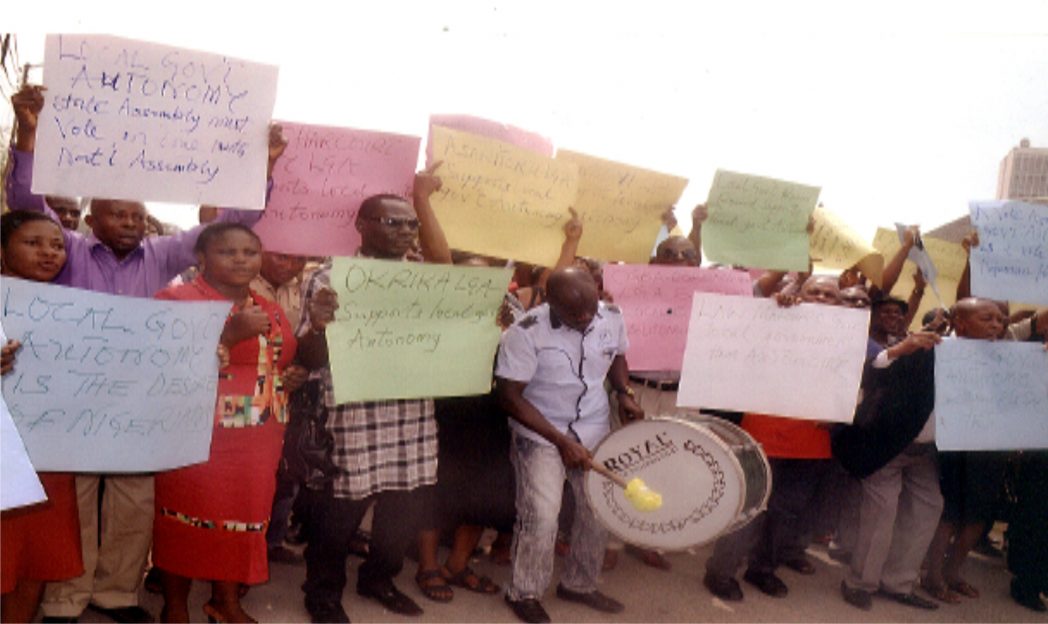Business
Expert Urges FG To Make Agric Attractive

Local Government workers of Rivers State on protest to the Rivers State House of Assembly for House Support to the Local Government Autonomy in the Nigerian Constitution Amendment. Photo: Chris Monyanaga
The Federal Government has been called upon to make agriculture more attractive to Nigerian youth in an effort to tackle the issue of unemployment in the country.
Prof. Malachy Akoroda, the Executive Director, Cocoa Research Institute of Nigeria (CRIN), stated this in an interview with The Tide source on Thursday in Abuja.
Akoroda said government must provide sufficient fund in order to attract more youths to the agricultural sector and to tackle the issue of unemployment in the country.
He urged the Federal and State Governments to make meaningful investment in agriculture to generate employment for the teeming youths and to ensure sustainable development of the economy.
“Encouraging the young people into farming should be an ongoing task for the government and agriculture sector in the country. Farming requires material, men and money.
“ Material in the sense that there are varieties of good products out there and money to pay for inputs that would be required at different stages of the value chain.
“Youth needs these three things to go into farming; wherever any youth get these three things from the government, it makes it possible to go in agriculture,’’ he said.
Akoroda said that agriculture remained the only means of generating jobs, if only various state governments could assist the Federal Government to sensitise the youth to embrace farming.
“We want to see agriculture everywhere across the country to replace oil.
“ There are many countries that do not have oil, but depend solely on agriculture because agriculture is profitable.’’
Akoroda, however, urged stakeholders and investors to take advantage of the Growth Enhancement Support (GES) Scheme of the Federal Government and invest in agriculture.
Business
NCAA Certifies Elin Group Aircraft Maintenance

Business
SMEDAN, CAC Move To Ease Business Registration, Target 250,000 MSMEs

Business
Blue Economy: Minister Seeks Lifeline In Blue Bond Amid Budget Squeeze

Ministry of Marine and Blue Economy is seeking new funding to implement its ambitious 10-year policy, with officials acknowledging that public funding is insufficient for the scale of transformation envisioned.
Adegboyega Oyetola, said finance is the “lever that will attract long-term and progressive capital critical” and determine whether the ministry’s goals take off.
“Resources we currently receive from the national budget are grossly inadequate compared to the enormous responsibility before the ministry and sector,” he warned.
He described public funding not as charity but as “seed capital” that would unlock private investment adding that without it, Nigeria risks falling behind its neighbours while billions of naira continue to leak abroad through freight payments on foreign vessels.
He said “We have N24.6 trillion in pension assets, with 5 percent set aside for sustainability, including blue and green bonds,” he told stakeholders. “Each time green bonds have been issued, they have been oversubscribed. The money is there. The question is, how do you then get this money?”
The NGX reckons that once incorporated into the national budget, the Debt Management Office could issue the bonds, attracting both domestic pension funds and international investors.
Yet even as officials push for creative financing, Oloruntola stressed that the first step remains legislative.
“Even the most innovative financial tools and private investments require a solid public funding base to thrive.
It would be noted that with government funding inadequate, the ministry and capital market operators see bonds as alternative financing.
-
Rivers4 days ago
Democratic Rule Return Sparks Renewed Debate In Rivers
-

 News4 days ago
News4 days agoTroops arrest five suspected criminals with concealed AK-47 rifles
-
Rivers2 days ago
FTAN Marks Tourism Day With March, Awards
-

 Sports4 days ago
Sports4 days agoPlateau Wins Kanemi, As Bayelsa, Bendel Played 1-1
-

 Education4 days ago
Education4 days agoVC Congratulates Igwe on Appointment as Pro-Chancellor
-

 Sports2 days ago
Sports2 days agoArsenal’s Saliba Wants to Be Best
-

 Politics4 days ago
Politics4 days agoAlleged Attack On Abure In Benin, LP Calls For Investigation
-

 Sports4 days ago
Sports4 days agoLa Liga: Atletico Bring Real Back To Earth

